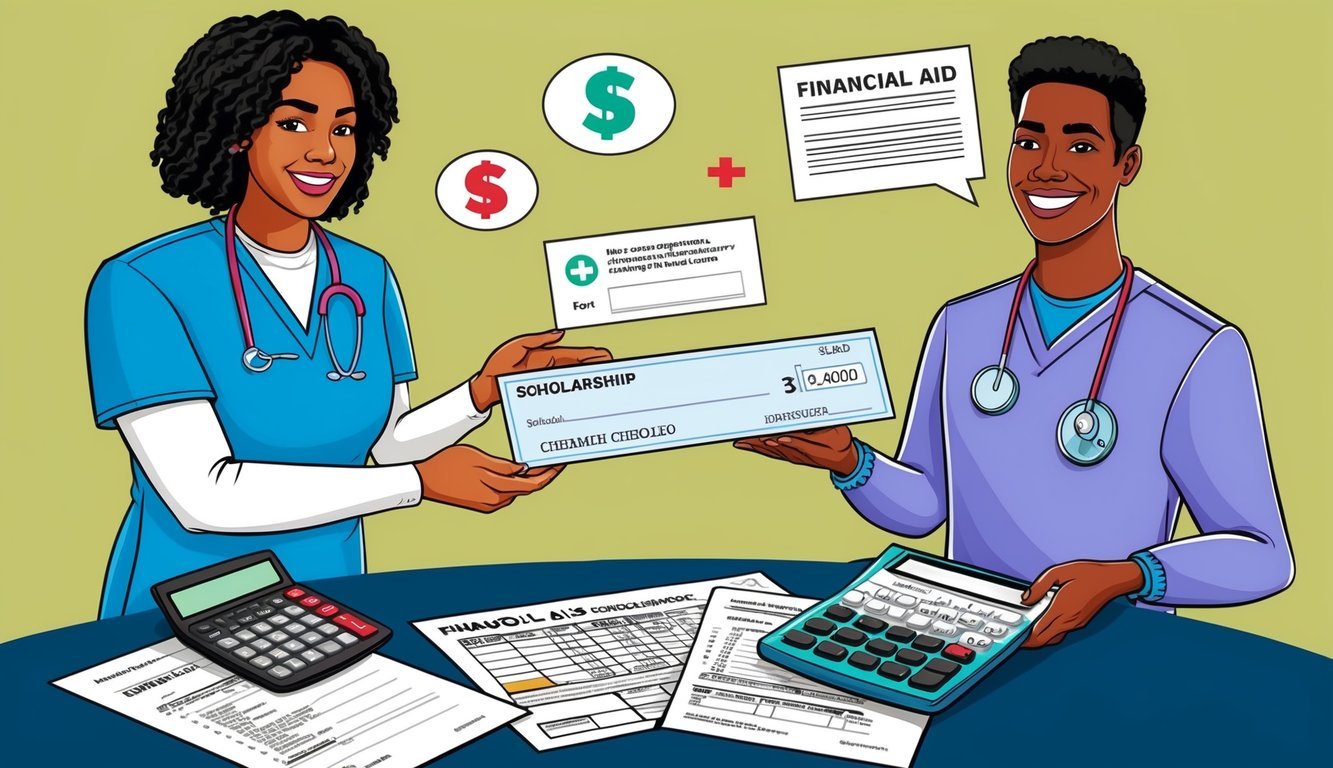Prospective students need to understand the financial commitment of pursuing a nursing degree.
The cost of nursing school varies widely.
Associate Degree in Nursing (ADN) programs typically range from $10,000 to $30,000.
Meanwhile, Bachelor of Science in Nursing (BSN) programs can go from $40,000 to over $100,000.
These costs depend on the institution and location.
As you navigate your options, it’s important to consider not only tuition but also additional expenses like uniforms, supplies, and exam fees.
Many factors influence the total cost, including the type of nursing program you choose and whether you attend a public or private institution.
Community colleges often offer more affordable ADN programs, while universities may present higher costs for BSN degrees.
For a more comprehensive view, resources such as Nurse.org provide detailed breakdowns of expenses associated with various nursing programs.
Knowing the potential financial implications can help you make informed decisions about your education and career path in nursing.
By researching available financial aid options and budgeting accordingly, you can set yourself up for success in this rewarding field.
Understanding the Costs of Nursing School
The cost of nursing school varies significantly based on several factors.
Here’s a breakdown of what you can expect:
| Cost Component | Estimated Range |
|---|---|
| Tuition | $2,500 – $50,000 per year |
| In-State Tuition | $25,000 – $60,000 for BSN |
| Out-of-State Tuition | $35,000 – $120,000 for BSN |
| Private Nursing School | Up to $140,000 for a BSN |
| Room and Board | $10,000 – $20,000 annually |
| Textbooks & Materials | $1,000 – $3,000 per year |
Tuition is often the most significant expense.
Public institutions generally charge lower rates for in-state residents compared to out-of-state students.
You may find costs for private nursing schools can reach as high as $140,000, especially for Bachelor’s programs.
Tuition costs depend on your program length and institution type.
Beyond tuition, consider room and board, which can add $10,000 to $20,000 to your annual expenses.
Additionally, textbooks and course materials may range from $1,000 to $3,000 each year.
For more detailed insights on specific programs, you can explore resources like Nurse.org and Forbes Advisor.
Types of Nursing Programs and Their Costs
Understanding the costs associated with different nursing programs is crucial for making informed decisions about your education.
Here is a breakdown of the key types of nursing degrees and their associated tuition costs.
Associate’s Degree in Nursing (ADN) Program Costs
The ADN program typically takes about two years to complete.
Tuition costs for ADN programs can vary significantly based on the institution.
| Type of Institution | Average Tuition Range |
|---|---|
| Community Colleges | $6,000 – $20,000 |
| Private Nursing Schools | $30,000 – $50,000 |
In addition to tuition, consider costs for books, supplies, and other fees.
These additional expenses can add anywhere from $1,000 to $3,000 per year.
You can find more details on ADN costs at Nurse.org.
Bachelor of Science in Nursing (BSN) Program Costs
A BSN program generally spans four years and offers a more comprehensive education than an ADN.
Tuition for BSN programs also varies widely, influenced by public versus private institutions.
| Type of Institution | Average Tuition Range |
|---|---|
| Public Universities | $30,000 – $70,000 |
| Private Universities | $80,000 – $100,000 |
Additional expenses, such as clinical fees and lab equipment, may run between $1,500 and $4,000 annually.
Detailed tuition information is available at RegisteredNursing.org.
Direct-Entry Master’s of Science in Nursing (MSN) and Doctor of Nursing Practice (DNP) Costs
The MSN program is a graduate-level option for those who already hold a bachelor’s degree in another field.
This program can cost you between $18,000 and $90,000, depending on various factors like school type and program length.
| Program Type | Average Tuition Range |
|---|---|
| MSN | $18,000 – $90,000 |
| DNP | $40,000 – $100,000 |
For both programs, non-tuition expenses can elevate total costs to about $200,000 over time, including living expenses and books.
Helpful details on MSN and DNP costs can be found at BestColleges.com.
Financial Aid and Scholarship Opportunities

Navigating the financial aspects of nursing school can be daunting.
Fortunately, various forms of financial aid and scholarship opportunities are available to help you manage the costs associated with your education.
Understanding these options can significantly ease your financial burden.
Federal and Private Loans
When considering how to finance your nursing education, loans can be a practical option.
Federal loans are often more favorable due to lower interest rates and more flexible repayment plans.
Here are key types of loans you might explore:
| Type | Description |
|---|---|
| Subsidized Loans | Interest does not accrue while you’re in school. |
| Unsubsidized Loans | Interest accrues from the moment the loan is taken. |
| Private Loans | Offered by banks or credit unions but generally have higher interest rates. |
You can apply for federal loans by completing the FAFSA.
It’s essential to consider all options while educating yourself about the terms associated with private loans.
Grants and Scholarships
Grants and scholarships are ideal as they do not require repayment.
Various scholarships are available specifically for nursing students, including those for disadvantaged learners.
Notable options include:
- Nurse Corps Program: Offers scholarships in exchange for a service commitment in underserved areas.
- State Nursing Scholarships: Many states offer financial assistance to promote nursing careers.
You should actively search for scholarships through platforms like Nurse.org or various nursing organizations that offer targeted financial assistance.
Applying early can enable you to access these resources.
Work-Study and Tuition Reimbursement Programs
Work-study programs can provide valuable financial support while you gain practical experience in the field.
These programs are typically part-time positions offered through your educational institution, allowing you to earn money to offset tuition costs.
Many healthcare employers provide tuition reimbursement programs for employees advancing their education.
Here’s what to know:
- Employer Tuition Reimbursement: Some employers cover a significant portion of your tuition in exchange for a commitment to remain with the organization for a specified time.
- Loan Repayment Programs: Certain programs help repay your loans if you work in high-need areas, facilitating a more affordable path to degree completion.
Whether you opt for work-study or tuition reimbursement, exploring these options can greatly assist in reducing your financial burden.
Additional Expenses During Nursing School
In addition to tuition fees, several other expenses can significantly impact your budget during nursing school.
Being aware of these costs can help you manage your finances effectively throughout your education.
Uniforms and Medical Supplies
You will need specific uniforms and medical supplies, including a stethoscope, scrubs, and clinical shoes.
Uniforms typically cost between $50 and $200, depending on the school’s requirements.
Medical supplies, such as a stethoscope, can range from $50 to $300, depending on brand and features.
| Item | Estimated Cost |
|---|---|
| Scrubs | $50 – $100 |
| Stethoscope | $50 – $300 |
| Clinical shoes | $30 – $100 |
You might also need items like a watch with a second hand and basic medical tools.
Budgeting for these necessities at the beginning of your program can help ensure you are always prepared for clinical practice.
Clinical Requirements and Examinations
Before starting clinical practice, you’ll need to fulfill multiple requirements, which can incur additional costs.
These include background checks, drug screenings, fingerprinting, and immunizations.
Together, these can total $200 to $500.
| Requirement | Estimated Cost |
|---|---|
| Background Check | $50 – $100 |
| Drug Screening | $30 – $100 |
| Immunizations (varies) | $200 – $300 |
| Fingerprinting | $20 – $50 |
Furthermore, you may need to pay for licensing exams like the NCLEX-RN, which typically costs around $200.
Keep these expenses in mind when planning your financial resources for nursing school.
Transportation and Living Expenses
Transportation costs can add up, especially if your clinical sites are off-campus.
This could include gas, public transportation fares, or parking fees.
Depending on your location, you might spend $50 to $150 monthly on transportation.
In addition, consider living expenses such as room and board.
If you decide to live off-campus or require childcare, these costs can be significant.
On average, college students can expect to pay $500 to $1,500 per month for rent and utilities.
| Expense | Estimated Monthly Cost |
|---|---|
| Transportation | $50 – $150 |
| Room and Board | $500 – $1,500 |
| Childcare | $200 – $1,000 |
Final Considerations for Prospective Nursing Students

When you think about nursing school, you need to be aware of various expenses beyond tuition.
These costs can add up significantly.
| Cost Type | Examples |
|---|---|
| Tuition | Varies by program; $18,000 – $100,000 for advanced degrees |
| Books and Supplies | Textbooks, uniforms, and clinical gear |
| Fees | Application, registration, and lab fees |
| Clinical Hours | Expenses may accrue from transportation and materials needed |
| Living Costs | Rent, food, and other daily expenses |
Some costs may not be immediately obvious.
For instance, hidden costs such as background checks, health record maintenance, and travel to clinical sites can impact your budget significantly.
If you are pursuing a Bachelor’s of Science in Nursing (BSN) or a Master’s of Science in Nursing (MSN), keep in mind that return on investment can vary. Private nursing schools often charge higher tuition than public institutions, but they may offer unique programs.
Research options like an RN to BSN program, which can enhance your credentials more affordably.
If you aspire to become a Nurse Practitioner (NP) or Certified Registered Nurse Anesthetist (CRNA), additional expenses for advanced education and clinical hours will also arise.
Understanding the full scope of nursing education costs will prepare you better for your future in the field.
For a deeper dive into the financial aspects of nursing school, you may refer to Nurse.org.

